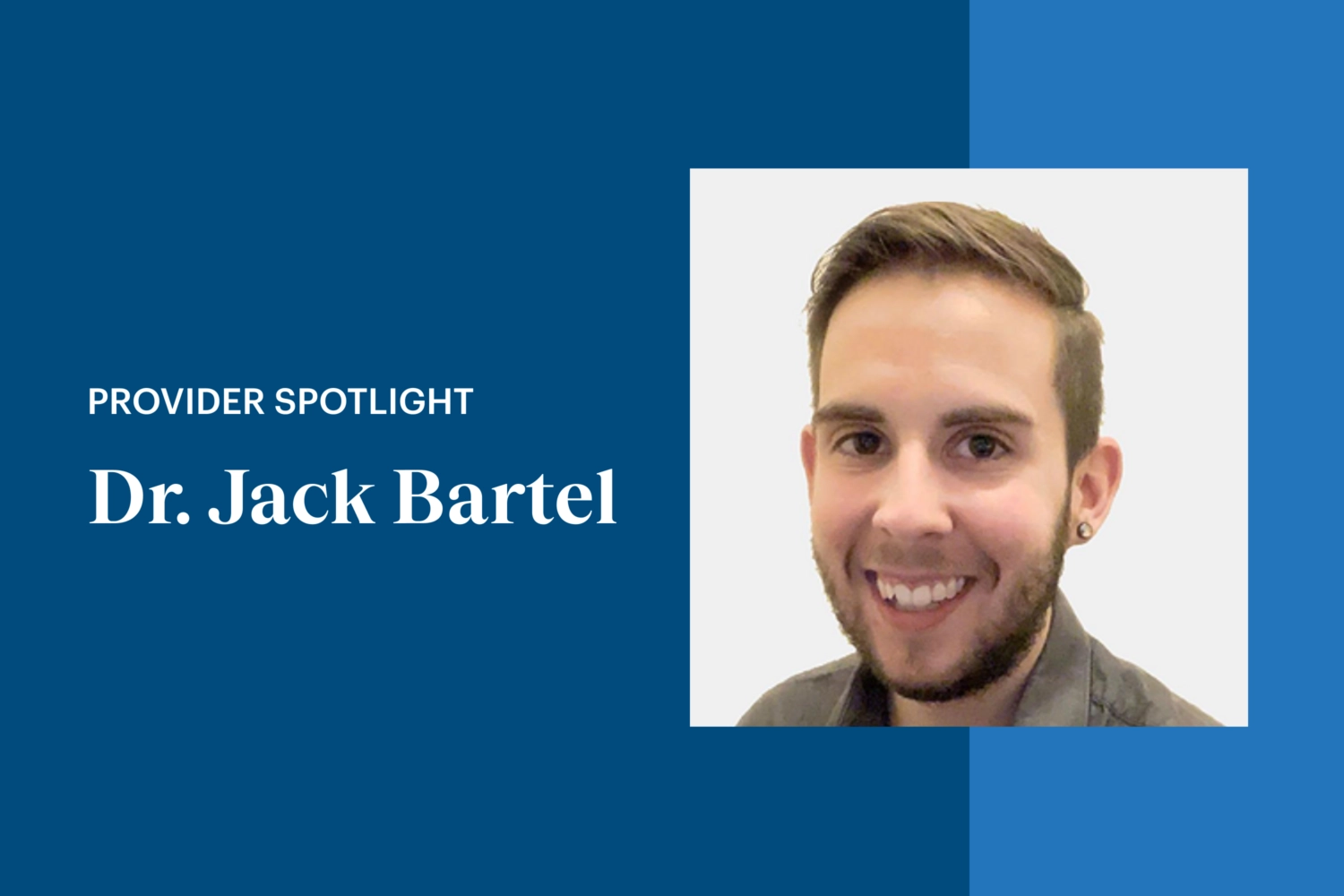For International Non-Binary People’s Day, we interviewed Dr. Jack Bartel, Psy.D, regarding how you can best be an ally to non-binary people.
In this article, he shares what identifying as “non-binary” means – both the textbook and non-textbook definitions – how you can best support non-binary people who have recently come out (hint: follow his three “A’s”), and when you should ask questions… and when you should do your own research. As he puts it: “Non-binary and transgender people are people too.”
Read on to educate yourself on this important and often under-discussed topic.
What are your specialties?
My primary specialties are health psychology and LGBTQ+ healthcare. Health psychology focuses on how biological, social and psychological factors influence health and illness. I work with patients on behavior change interventions like goal setting, smoking cessation, pain management, relationships with food, medication adherence, and adjustment to medical diagnoses.
What is your education?
I went to University of Central Florida for my undergraduate degree, and then Florida Institute of Technology, where I got my doctorate in clinical psychology.
How did you get started?
I grew up with a family in healthcare, but was always more driven towards mental healthcare and how this impacted individuals’ physical health. At the same time, I saw the lack of knowledge and need for competent LGBTQ+ mental health providers. I took a psychology class in high school and thought pursuing more education in this area would be really interesting. While I originally thought about pursuing a career in teaching or technical theater, I eventually decided to go the college route. It’s interesting – I’ve fallen into teaching and consulting work, but I’ve also seen how everything comes full circle.
What is most rewarding about your career?
Seeing the progress people make and the way it changes their lives for the better is extremely rewarding. Witnessing the relief individuals feel knowing that they have an LGBTQ+-competent therapist and a space where they can be authentic and understood is gratifying. In the realm of teaching and consultation, it’s encouraging to see people want to learn how to provide more affirming spaces and be better allies.
Right now, that’s especially important, with all of the negative actions being taken towards trans individuals politically, socially, etc. It reminds me that there are people out there who do care and want things to change for the better.
What would you say is the textbook definition of what it means to identify as non-binary?
Textbook would be people whose gender identity doesn’t fit with ‘man’ or ‘woman.’
What would you say is the NON-textbook definition — aka more complex — definition of non-binary?
More complex would be: individuals who defy the gender binary or simply do not subscribe to social constructs expected or placed on them regarding gender. They are more than their gender.
How can you support someone who has come out as non-binary?
Dr. Bartels tips include following these 3 A’s:
Awareness
Who are transgender and non-binary individuals? What can you do to listen to their stories and experiences? How can you take time to learn more about the discrimination, violence, and other barriers these individuals face? It is important to take time to learn on your own through available resources such as HRC, GLAAD, or The Trevor Project. If you are a healthcare provider, this can also be attending available CE’s and courses. Do not only rely on transgender and non-binary individuals to be your educators.
Action
What can you DO? Awareness doesn’t make change happen, it just increases knowledge that change is needed. Do you donate to gender affirming surgery or hormone funds, particularly those for Black and Latinx individuals? Do you put Transgender Day of Rememberance (TDOR) and Transgender Awareness Week on your company’s calendar? Do you donate money, clothing, or other items to homeless transgender and non-binary youth?
Accountability
How can you model the behaviors you want to see and make sure others follow? You have to walk the talk if you want others to follow. Accountability is not a one time thing. This might be making sure co-workers, friends, or family use someone’s correct pronouns even when the person isn’t present. This could also be standing up and speaking out about transphobic comments you hear an individual make.
Non-binary and transgender people are people too. Their voices and stories matter and they are just as deserving of respect, rights, and dignity as others.
How should you NOT support someone who has come out as non-binary?
Don’t ask them about their genitals. Don’t call them by the wrong name and pronoun; if you do, simply correct yourself. Do your own research and be mindful of the questions you are asking. Ask yourself, is this information needed to respectfully interact or because I’m curious? If curiosity is a driving force, take time to answer the question on your own.
Conclusion
Thank you to Dr. Bartel for speaking with us and providing information on this extremely relevant topic. To those who identify as non-binary, we celebrate you on International Non-Binary People’s Day – and every day. Because here at Doctor On Demand by Included Health, we see you 24/7, 365.



